Andrey Sushentsov: The people who brought you the Iraq war loudly support arming Ukraine. Where will this lead?
Despite the disastrous consequences of the US invasion of Iraq twenty years ago, many of those responsible for that war – and their media and academic cheerleaders are back for more

This year’s twentieth anniversary of the illegal Iraq invasion paradoxically coincided with major international events. Xi Jinping, General Secretary of the Central Committee of the Communist Party of China, was in Moscow on the day, while a Russia-Africa Parliamentary Forum opened at the same time.
In 2003, at the height of its power, the US proclaimed its "unipolar moment" in which it would dominate unchallenged, needing no allies and tolerating no objections from adversaries. History, it was believed, had a single purpose, and they would stop at nothing to achieve it. Indeed, American military, political and economic dominance seemed total at the time, echoing the sentiments of Henry Kissinger, who a few years earlier had written "America at the Apex." Twenty years later, we are witnessing the flowering of multi-polarity: in Moscow, the General Secretary of the Central Committee of the Communist Party of China was talking to the Russian President, two countries contributing to a change the world has not seen in a hundred years. This transience of world history shows how quickly historical cycles change, but it is also important that the US itself, through its actions in different parts of the world, is accelerating its course.
One of the most important strategic mistakes made by Washington was the invasion of Iraq. Based on a false pretext and the deliberate misleading the international community, it led to a series of significant war crimes, a catastrophic civil war, the shattering of Iraqi statehood and enormous repercussions for the entire Middle East. Just a few years of American presence in Iraq resulted in huge numbers civilian deaths, indiscriminate use of force, and the destruction of several cities, including Mosul. During the evacuation of the Russian embassy amid the 2003 US invasion, a convoy of diplomats came under American fire and several were injured. US private military contractors, who at one point had the same presence in the country as official troops, committed a number of war crimes. The abuse of prisoners by the US military at Abu Ghraib prison near Baghdad has been well documented. When the International Criminal Court raised the question of American citizens being charged over offenses in Afghanistan and Iraq, the US responded that it would prosecute the judges who raised the issue and that they should withdraw their initiatives immediately.
Arguably the greatest crime of the US in Iraq has been to create a civil war that has resulted in a terrible number of casualties with estimates ranging from 600,000 to one million.
From 2005 to 2007, the country’s population curve flattened, despite the fact that it has always had one of the highest birth rates in the region. The dismantling of the central government triggered geopolitical processes in the region and power in the formerly Sunni-ruled country fell into the hands of the Shia Arab majority, which began a rapprochement with Shia Iran. Since then, Tehran’s strategic position in Iraq has remained significant.
Some of the consequences of the US invasion have backfired as well. For example, the fight against terror led to an increase in the influence of ISIS, an organization banned in Russia, in Iraq. Unexpectedly, Iran's strengthened role in the country meant that 150,000 US troops were unable to control the situation in Iraq, while a few dozen Iranian diplomats in the embassy in Baghdad were quite capable of doing so. The metastasis of the Arab Spring, which began to spread to various countries in the region, was also one of the consequences of the Iraq war.
Meanwhile, US financial costs for the war are estimated at several trillion dollars. Overall, the politically unsuccessful operations in Iraq and Afghanistan have led to a decline in American influence and status in the region, as evidenced by the recent restoration of diplomatic relations between Saudi Arabia and Iran, mediated by China.
The Americans formulated a reasonable objective for the military operation as early as 2007. It was voiced by General David Petraeus at a US congressional hearing. In response to a question about American interests in the country, he said, “Our purpose is not to create a Jeffersonian democracy, our purpose is to create the conditions for our troops to withdraw.” The implication was that pulling out should not look like defeat. At the time, this reasoned objective was well in line with American interests and showed the depth of the strategic error the Americans had made in preparing for the 2003 invasion.
Today, many of those responsible for that war – and their media and academic cheerleaders – are now loudly supporting Washington’s position on Ukraine.
It’s unlikely that the impact of their actions will be any different this time.
https://www.rt.com/news/573862-from-iraq-to-ukraine/



0 Comments:
Post a Comment
Subscribe to Post Comments [Atom]
<< Home